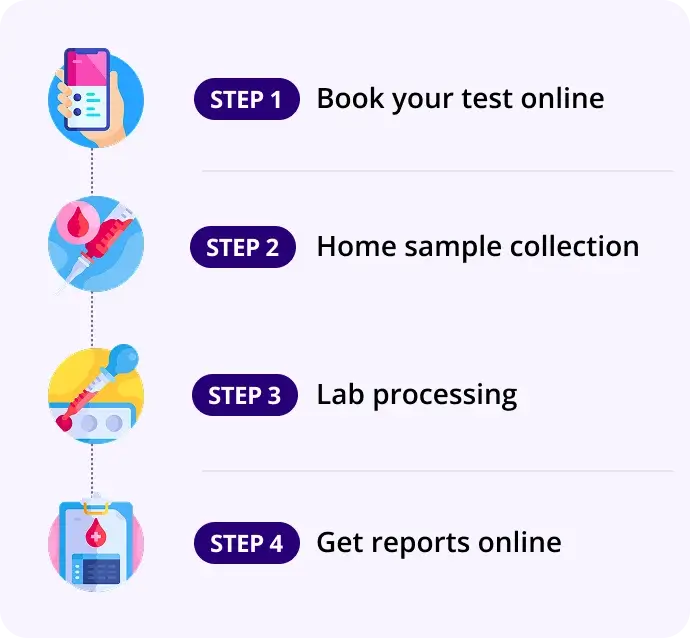Search for
APTT
Liver
Report in 48Hrs
At Home
No Fasting Required
Details
The APTT test measures the time it takes for blood to clot via the intrinsic and common coagulation pathways
₹295₹418
29% OFF
FREE:
Ai Insights
APTT (Activated Partial Thromboplastin Time) - Comprehensive Medical Test Guide
- Why is it done?
- Measures the intrinsic and common pathways of blood clotting cascade by evaluating clotting factor activity and function
- Evaluates time required for blood plasma to clot after specific activation reagents are added
- Screens for bleeding disorders and clotting factor deficiencies (Factors VIII, IX, XI, XII, and fibrinogen)
- Monitors anticoagulation therapy with heparin or warfarin
- Detects presence of inhibitors or anticoagulants (lupus anticoagulant, factor-specific inhibitors)
- Investigates unexplained bleeding or bruising
- Pre-operative assessment before surgery to evaluate bleeding risk
- Baseline testing before starting anticoagulant therapy or when transitioning between anticoagulants
- Normal Range
- Reference Range: 30-40 seconds (may vary by laboratory and reagent used)
- Unit of Measurement: Seconds (sec)
- Normal Result Meaning: Blood clotting time is within expected range, indicating adequate clotting factors and normal intrinsic/common pathway function
- Prolonged (Elevated) APTT: >40 seconds - Blood takes longer than normal to clot, may indicate clotting factor deficiency, inhibitor presence, or anticoagulant effect
- Shortened (Low) APTT: <30 seconds - Blood clots faster than normal, may indicate increased clotting risk, hypercoagulability, or testing artifact
- Critical Values: Results >60 seconds usually prompt immediate laboratory and physician notification due to significant bleeding risk
- Therapeutic Range (on Heparin Therapy): Typically 1.5-2.5 times the normal baseline or 45-70 seconds depending on clinical situation
- Interpretation
- Prolonged APTT Causes:
- Clotting factor deficiencies (Factors VIII, IX, XI, XII, fibrinogen, prothrombin)
- Heparin therapy (unfractionated or low-molecular-weight when on high doses)
- Warfarin therapy (affects vitamin K-dependent factors)
- Lupus anticoagulant (autoimmune inhibitor)
- Factor-specific inhibitors (hemophilia with inhibitors)
- Disseminated intravascular coagulation (DIC)
- Severe liver disease affecting clotting factor synthesis
- Vitamin K deficiency (affects factors II, VII, IX, X)
- Fibrinogen abnormalities or severe hypofibrinogenemia
- Specific inherited bleeding disorders (Hemophilia A and B, von Willebrand disease)
- Shortened APPT Causes:
- Hypercoagulable states or thrombophilia conditions
- Increased Factor VIII levels
- Laboratory artifact or blood sample hemolysis
- Early pregnancy or estrogen use
- Mixing Study Interpretation:
- If APPT corrects with mixing study (patient plasma mixed with normal plasma) - suggests factor deficiency
- If APPT remains prolonged after mixing - suggests presence of inhibitor or anticoagulant
- Factors Affecting Test Results:
- Improper blood collection (insufficient blood or excess anticoagulant in collection tube)
- Hemolysis, lipemia, or icterus in sample
- Temperature variation during sample handling
- Delayed sample processing or prolonged storage
- Different laboratory reagents and analyzers producing slightly different values
- Patient medications (aspirin, NSAIDs, antibiotics, steroids)
- Prolonged APTT Causes:
- Associated Organs
- Primary Organs/Systems:
- Hematologic system (blood and blood-forming organs)
- Liver (primary site of most clotting factor synthesis)
- Bone marrow (production of platelets and blood cells involved in clotting)
- Conditions Associated with Abnormal Results:
- Hemophilia A (Factor VIII deficiency) and Hemophilia B (Factor IX deficiency)
- Von Willebrand Disease
- Liver disease and cirrhosis (impaired clotting factor synthesis)
- Kidney disease (uremia affecting platelet function and Factor V)
- Systemic Lupus Erythematosus (SLE) and antiphospholipid syndrome
- Disseminated Intravascular Coagulation (DIC) from infections, malignancy, trauma
- Thrombotic thrombocytopenic purpura (TTP) and hemolytic uremic syndrome (HUS)
- Acute leukemia and other hematologic malignancies
- Vitamin K deficiency and malabsorption syndromes
- Complications Associated with Abnormal Results:
- Prolonged APPT complications: Spontaneous bleeding, hemorrhage (GI, intracranial, joint), excessive bleeding after surgery or trauma, internal bleeding
- Shortened APPT complications: Venous thromboembolism (DVT, PE), arterial thrombosis, stroke, myocardial infarction, recurrent pregnancy loss
- Primary Organs/Systems:
- Follow-up Tests
- If APPT is Prolonged:
- Mixing study (1:1 mix of patient and normal plasma) - differentiates factor deficiency from inhibitor
- Prothrombin time (PT) - evaluates extrinsic pathway
- Fibrinogen level - assesses fibrinogen adequacy
- Platelet count - evaluates thrombocytopenia
- Specific factor assays (Factor VIII, IX, XI, XII levels)
- Lupus anticoagulant testing - if inhibitor suspected
- Thrombin time (TT) - assesses fibrinogen function
- Bleeding time - evaluates platelet function (if prolonged)
- Von Willebrand factor antigen and activity testing
- If APPT is Shortened or Normal:
- Thrombophilia testing if hypercoagulability suspected (Factor V Leiden, prothrombin mutation, antithrombin III, protein C/S)
- Repeat APPT if artifact suspected
- For Therapeutic Monitoring:
- Repeat APPT 24-48 hours after heparin initiation or dose change
- Regular monitoring (every 24 hours for first few days, then daily or as needed) during heparin therapy
- Baseline APPT before starting warfarin, then INR monitoring during warfarin therapy (APPT not used for warfarin monitoring)
- APPT monitoring when switching from heparin to warfarin
- Related Coagulation Studies (Complementary Information):
- Complete blood count (CBC) - platelet and hemoglobin levels
- Liver function tests - assess hepatic synthetic function
- Kidney function tests - evaluate renal contribution to coagulopathy
- If APPT is Prolonged:
- Fasting Required?
- Fasting Requirement: No
- Food/Fluid Restrictions: No fasting required; patient may eat and drink normally before test
- Medications: Continue all anticoagulant medications (heparin, warfarin, DOACs) as prescribed unless specifically instructed otherwise by physician
- Medications to Disclose: Inform laboratory of aspirin, NSAIDs, antibiotics, steroids, or any recent medication changes
- Patient Preparation:
- No special preparation needed
- Wear comfortable, loose-fitting clothing to facilitate blood draw
- Inform phlebotomist of anxiety about needles or history of difficult blood draws
- Ensure adequate hydration before test (drink water)
- Report any recent bleeding episodes or bleeding tendency to healthcare provider before test
- Sample Collection Details:
- Blood collected by venipuncture into a 3.2% sodium citrate tube (light blue-topped tube)
- Tube must be filled to correct volume (typically 2.7 mL) to maintain proper blood-to-anticoagulant ratio
- Sample must be inverted 3-4 times immediately after collection to mix anticoagulant
- Sample must be kept at room temperature and processed within 1-2 hours of collection
- Do not refrigerate or freeze sample before analysis
How our test process works!

